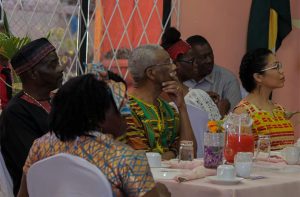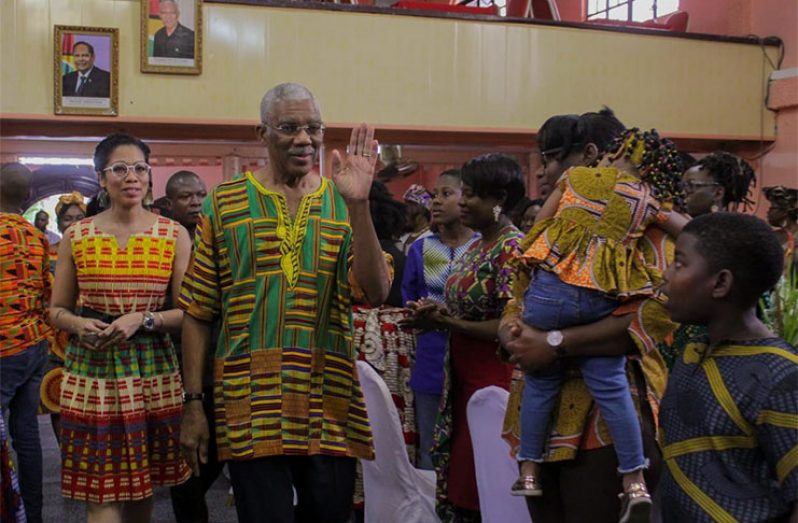— President commits to restoring free education from nursery to university
PRESIDENT David Granger has underscored that education is an integral component of emancipation and independence, while pointing out that greater access must continue to be facilitated as it is a key component of national development.
“Emancipation means independence [and] emancipation means education,” President Granger said at the Glory Light Tabernacle’s Sunrise Prayer Breakfast, on Thursday morning. The occasion was in observance of the 181st anniversary since the abolishment of slavery.
Explaining his statement, the President reminded that the enslaved Africans, who once toiled on the plantations, were denied access to educational opportunities that would provide avenues for social mobility. Even so, however, they pooled their money together to purchase villages and create their own livelihoods.
And according to him, it was education that “unlocked opportunities” to free them from the cycle of intergenerational poverty.
“Once you break that cycle through education, educated people will have educated children and the world will progress,” he posited.
Moreover, he noted that education does not only refer to knowledge in academia but also the inculcation of morals and values. To this end, he said the villages established by Africans were the crucibles of education of good conduct and of religious conduct.
The President urged that each church must either have a school nearby or “adopt” a school so that children would garner those values.
“I want us to go back to the time where every village had a school… schools must be convenient, schools must be accessible,” the President said, adding: “I want to see a country with 100 per cent primary education.”
DECADE OF DEVELOPMENT
The International Decade for People of African Descent, 2015 to 2024, was proclaimed by the United Nations (UN) General Assembly in a Resolution adopted on 23 December, 2013. The theme of this International Decade is: “People of African descent: recognition, justice and development.”

President Granger, however, said that Guyana will have its own “Decade of Development for all”, which will begin in 2020 and last until 2029. This decade, he said, will prioritise education since it is an entitlement and a right for all people.
In crafting this decade, the head of state disclosed that “Oil will produce profits and those profits will go first and foremost into education.”
He further noted that instead of having those profits benefit only a select few, he intends on ensuring that it will be used to foster educational opportunities for the population.
“Every child must be in school, every village must have a school. This decade of development means that in every single village, every child must have access to go to school,” he said.
FREE EDUCATION
Added to this, President Granger also noted that it is his aim to restore the right to free education, in accordance to the Constitution.
According to Article 27 of the Constitution of Guyana: “Every citizen has the right to a free education from nursery to university, as well as at non-formal places where opportunities are provided for education and training.”
This article falls in Chapter II, which connotes the principles and basis of the political, economic and social system. Also detailed in this section is every person’s right to sovereignty, the right to own personal property, the right to free health and social care, inter alia.
Guyana, under the People’s National Congress (PNC) Government, offered free education from nursery to university. However, today, only education offered from nursery to secondary is free.
In light of this, an informal group of young people have banded together, earlier this year, into what is called the “Free University of Guyana Movement”.
Speaking to the Guyana Chronicle, a member of the movement and advocate for ‘Free UG’, Elson Lowe, related that the group is advocating that a portion of oil revenues be used to make education at the university free once again.
Already, the incumbent government has been attempting to foster greater access to educational opportunities. President Granger, through a programme started in observance of his birthday a few years ago, crafted the Public Education Transport System (which was formerly known as the 5Bs Programme).
On Thursday, he shared that through this initiative about 30 buses are taking children to school for free and dozens of boats doing the same. This, he said, is in an attempt to bridge disparities in the education system.
“When I say every child in school, I mean every child in school,” the President stressed.
He also noted that education today is as important to provide opportunities for a better life as it was 18 decades ago when enslaved Africans were emancipated.





.jpg)








